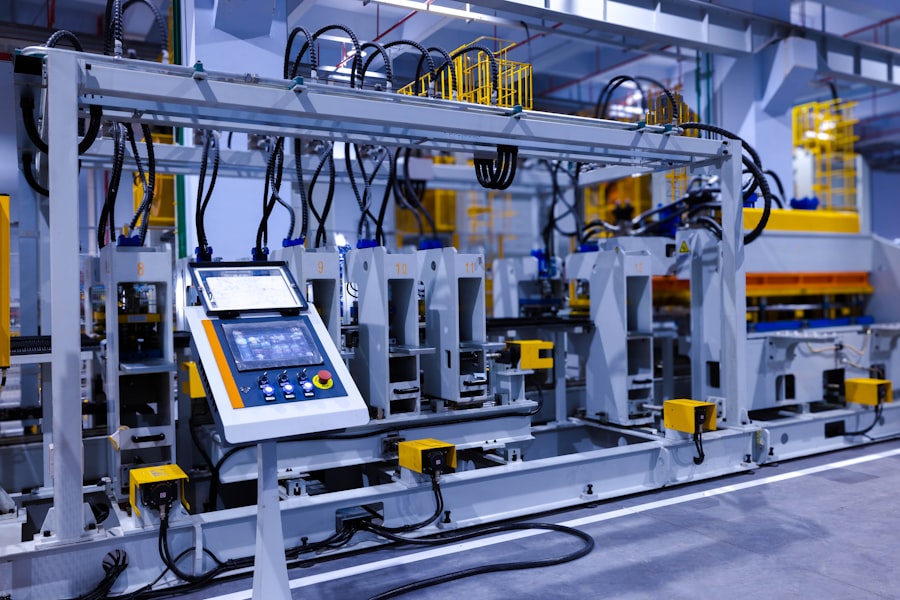In recent years, the workplace has undergone a significant transformation, largely driven by the rise of automation. This shift has been fueled by advancements in technology, particularly in robotics and artificial intelligence, which have enabled businesses to streamline operations and enhance productivity. As companies seek to remain competitive in an increasingly globalized market, the adoption of automated systems has become not just a trend but a necessity.
From manufacturing to service industries, automation is reshaping how tasks are performed, leading to a re-evaluation of traditional work processes. The integration of automation into the workplace has not only changed the way tasks are executed but has also influenced the overall structure of organizations. Companies are now investing heavily in automated solutions that can handle repetitive tasks, allowing human employees to focus on more complex and creative aspects of their jobs.
This shift is indicative of a broader movement towards efficiency and innovation, as businesses recognize the potential of automation to drive growth and improve service delivery. As a result, the rise of automation is not merely a technological advancement; it represents a fundamental change in the nature of work itself.
Key Takeaways
- Automation is on the rise in the workplace, transforming industries and job roles.
- Job roles and responsibilities are being impacted by automation, leading to a shift in required skills and tasks.
- Adapting to the changing work environment involves embracing automation and learning new skills.
- Artificial intelligence plays a significant role in shaping the future of work, influencing how tasks are performed and managed.
- Automation brings benefits for businesses and employees, increasing efficiency and productivity.
The Impact of Automation on Job Roles and Responsibilities
The impact of automation on job roles and responsibilities is profound and multifaceted. As machines take over routine tasks, many traditional job functions are being redefined or rendered obsolete. For instance, in manufacturing, assembly line jobs that once required human labor are increasingly being performed by robots equipped with advanced sensors and artificial intelligence.
This shift has led to a decline in certain job categories while simultaneously creating new opportunities in areas such as programming, maintenance, and oversight of automated systems. Moreover, the nature of work is evolving as employees are required to adapt to new technologies and workflows. Roles that were once focused on manual labor are now shifting towards positions that demand critical thinking, problem-solving skills, and technological proficiency.
This transformation necessitates a reevaluation of workforce training and development programs to ensure that employees possess the skills needed to thrive in an automated environment. As job responsibilities change, organizations must also consider how to effectively manage this transition to maintain employee morale and productivity.
Embracing Automation: Adapting to the Changing Work Environment

Embracing automation requires a proactive approach from both employers and employees. Organizations must foster a culture that encourages adaptability and continuous learning, recognizing that the ability to navigate technological changes will be crucial for future success. This involves investing in training programs that equip employees with the skills necessary to work alongside automated systems.
By prioritizing upskilling and reskilling initiatives, companies can help their workforce transition smoothly into new roles that complement automation rather than compete with it. On an individual level, employees must also take responsibility for their own professional development.
This proactive mindset not only benefits employees in terms of career advancement but also contributes to a more resilient workforce capable of adapting to future changes. By embracing automation as an opportunity for growth rather than a threat, both organizations and individuals can thrive in an increasingly automated world.
The Role of Artificial Intelligence in Shaping the Future of Work
| Metrics | Data |
|---|---|
| Percentage of jobs impacted by AI | 47% |
| Percentage of companies using AI for recruitment | 67% |
| Percentage of tasks that can be automated with AI | 45% |
| Percentage of workers worried about AI replacing their jobs | 56% |
Artificial intelligence (AI) plays a pivotal role in shaping the future of work, serving as a catalyst for innovation across various industries. By leveraging machine learning algorithms and data analytics, AI systems can analyze vast amounts of information quickly and accurately, enabling businesses to make informed decisions and optimize operations. This capability enhances productivity and allows organizations to respond more effectively to market demands, ultimately leading to improved customer satisfaction.
Furthermore, AI is transforming job roles by automating complex tasks that were once thought to require human intelligence. For example, AI-driven chatbots are revolutionizing customer service by providing instant responses to inquiries, freeing human agents to handle more intricate issues. As AI continues to evolve, its integration into the workplace will likely expand, leading to new applications that further redefine job functions.
The challenge for organizations will be to harness the potential of AI while ensuring that employees are equipped to work alongside these advanced technologies.
The Benefits of Automation for Businesses and Employees
The benefits of automation extend beyond mere efficiency gains for businesses; they also encompass significant advantages for employees. For organizations, automation can lead to reduced operational costs, increased output, and improved accuracy in processes. By automating repetitive tasks, companies can allocate resources more effectively and focus on strategic initiatives that drive growth.
This not only enhances competitiveness but also positions businesses for long-term success in an ever-evolving marketplace. For employees, automation can lead to more fulfilling work experiences. With machines handling mundane tasks, workers have the opportunity to engage in more meaningful activities that require creativity and critical thinking.
This shift can result in higher job satisfaction and increased motivation among employees. Additionally, as organizations embrace automation, they may also create new roles that focus on overseeing automated systems or developing innovative solutions, providing employees with opportunities for career advancement and professional growth.
Overcoming Challenges and Reskilling for the Future of Work

Despite the numerous benefits associated with automation, challenges remain that must be addressed for successful implementation. One significant concern is the potential displacement of workers whose jobs may be rendered obsolete by automated systems. To mitigate this impact, organizations must prioritize reskilling initiatives that prepare employees for new roles within the company or even in different industries.
By investing in training programs that focus on transferable skills such as problem-solving and adaptability, businesses can help their workforce navigate the changing job landscape. Moreover, fostering a culture of lifelong learning is essential for overcoming challenges related to automation. Organizations should encourage employees to pursue continuous education and professional development opportunities, whether through formal training programs or self-directed learning initiatives.
By creating an environment where learning is valued and supported, companies can empower their workforce to embrace change and thrive in an automated future.
The Ethical Considerations of Automation in the Workplace
As automation becomes increasingly prevalent in the workplace, ethical considerations surrounding its implementation must be carefully examined. One major concern is the potential for bias in automated systems, particularly those driven by artificial intelligence. If not properly managed, these systems can perpetuate existing inequalities or create new forms of discrimination based on race, gender, or socioeconomic status.
Organizations must prioritize transparency and fairness in their use of automated technologies to ensure that all employees are treated equitably. Additionally, there are ethical implications related to job displacement and worker welfare. As automation continues to reshape industries, companies have a responsibility to consider the impact on their employees’ livelihoods.
This includes providing support for those affected by job loss through retraining programs or severance packages. By taking a proactive approach to these ethical challenges, organizations can foster trust among their workforce and contribute positively to society as a whole.
Embracing Automation: Creating a More Efficient and Productive Workforce
Embracing automation presents an opportunity for organizations to create a more efficient and productive workforce. By integrating automated systems into daily operations, companies can streamline processes and reduce the likelihood of human error. This increased efficiency not only enhances productivity but also allows employees to focus on higher-value tasks that require creativity and strategic thinking.
Moreover, automation can facilitate better collaboration among team members by providing tools that enhance communication and project management. For instance, automated scheduling systems can help teams coordinate their efforts more effectively, while data analytics tools can provide insights that inform decision-making processes. By leveraging these technologies, organizations can foster a culture of collaboration that drives innovation and improves overall performance.
The Future of Work: How Automation is Shaping Industries
The future of work is being profoundly shaped by automation across various industries. In sectors such as manufacturing, logistics, healthcare, and finance, automated systems are revolutionizing operations by enhancing efficiency and accuracy. For example, in healthcare, robotic surgical systems are enabling surgeons to perform complex procedures with greater precision while minimizing recovery times for patients.
Similarly, in finance, algorithmic trading systems are transforming how investments are managed by analyzing market trends at lightning speed. As industries continue to evolve under the influence of automation, it is essential for organizations to remain agile and responsive to change. This may involve rethinking business models or exploring new markets that leverage automated technologies.
By staying ahead of industry trends and embracing innovation, companies can position themselves for success in an increasingly automated future.
Embracing Automation: Redefining the Concept of Work
The rise of automation is redefining the very concept of work itself. As machines take over routine tasks, traditional notions of employment are being challenged. The focus is shifting from simply completing tasks to creating value through innovation and collaboration.
In this new paradigm, workers are encouraged to think critically about their contributions and seek out opportunities for creative problem-solving. Moreover, this shift is prompting a reevaluation of work-life balance as automation allows for greater flexibility in how tasks are completed. Remote work arrangements facilitated by technology enable employees to manage their time more effectively while maintaining productivity levels.
As organizations embrace this new understanding of work, they have the potential to create environments that prioritize employee well-being alongside operational efficiency.
The Importance of Collaboration and Innovation in the Age of Automation
In the age of automation, collaboration and innovation are paramount for success. As organizations integrate automated systems into their operations, fostering a culture that encourages teamwork and creative thinking becomes essential. Collaborative efforts can lead to innovative solutions that harness the full potential of technology while addressing challenges associated with its implementation.
Furthermore, cross-disciplinary collaboration can drive innovation by bringing together diverse perspectives and expertise. By encouraging employees from different departments or backgrounds to work together on projects involving automation, organizations can unlock new ideas and approaches that may not have emerged within siloed teams. In this way, collaboration becomes a key driver of success in an increasingly automated world.
In conclusion, the rise of automation presents both challenges and opportunities for businesses and employees alike. By embracing this technological shift with a focus on adaptability, ethical considerations, and collaboration, organizations can create a more efficient workforce while redefining the concept of work itself. As industries continue to evolve under the influence of automation and artificial intelligence, it is crucial for all stakeholders to engage proactively with these changes to ensure a prosperous future for everyone involved.
In the rapidly evolving landscape of work, automation is poised to play a transformative role in shaping the future. As businesses increasingly integrate advanced technologies, the nature of jobs and the skills required are undergoing significant changes. A related article on this topic can be found on How Wealth Grows, which delves into the implications of automation on the workforce and the economy. For more insights, you can read the full article by visiting How Wealth Grows. This resource provides a comprehensive analysis of how automation is influencing various industries and what it means for the future of work.
WATCH THIS! The AI Paradox: Who Buys the Stuff When Nobody Has a Job?
FAQs
What is automation in the context of the future of work?
Automation in the context of the future of work refers to the use of technology, such as artificial intelligence and robotics, to perform tasks that were previously carried out by humans. This can include repetitive tasks, data analysis, and even decision-making processes.
How will automation impact the future of work?
Automation is expected to significantly impact the future of work by changing the nature of jobs and the skills required to perform them. While some tasks may be automated, new opportunities for employment in the development and maintenance of automation technologies are also expected to emerge.
What are the potential benefits of automation in the future of work?
Automation in the future of work has the potential to increase efficiency, productivity, and accuracy in various industries. It can also lead to the creation of new job roles and the improvement of working conditions for employees.
What are the potential challenges of automation in the future of work?
Challenges associated with automation in the future of work include concerns about job displacement, the need for retraining and upskilling of the workforce, and potential ethical and social implications of widespread automation.
How can individuals prepare for the impact of automation on the future of work?
Individuals can prepare for the impact of automation on the future of work by acquiring new skills, staying updated on technological advancements, and being adaptable to changes in the job market. Lifelong learning and a willingness to embrace new technologies will be crucial for success in the future of work.
